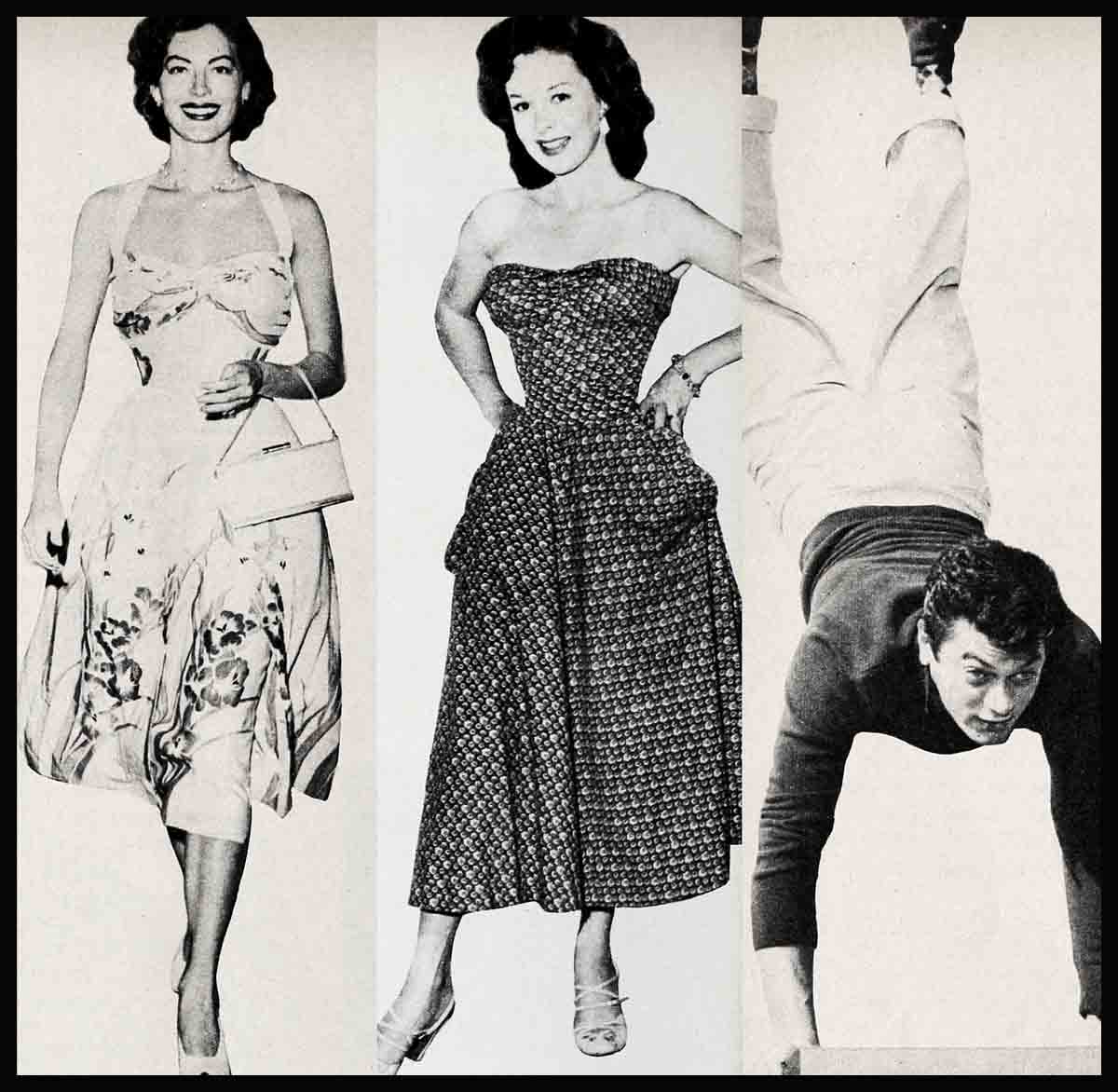
How Hollywood Has Changed Them
“Going Hollywood” is a phrase no stars want attached to their names, even though it’s true. The term has all the ugly connotations of forgetting to see old friends “who knew them when,” acquiring a plush house, a swimming pool, and a temperament to match the setup. I’ve heard weary, cynical studio press agents say of a star, “I remember when she’d stand on her head in front of the city hall at high noon to get her name in the papers; now she thinks she ought to have an Oscar for posing for a picture.” I’ve heard Bob Mitchum say, “I haven’t changed, but my friends have. If I don’t speak to a doorman, I’m a snob. Before I got into pictures, the doorman would have thrown me through the door.”
The only change I’ve seen in Bob is his acquisition of material things. He came into town a character and has remained one, much to the despair of those who try to control him and have him behave like a star.
Sudden fame, wealth, and the adoration of millions of fans are items not easy to take.
The first time I met Tony Curtis, he dropped by my office looking anything but the suave sophisticate he is today. He was wearing a sweat shirt, blue jeans, and canvas sneakers. When we walked a few blocks down Hollywood Boulevard, not one girl turned to take a second look. But when Jan Sterling made a personal appearance with Tony in a New York theatre, about a thousand females were waiting in the foyer to mob the boy. “I wouldn’t have believed it if I hadn’t seen it,” said Jan. “The girls were so excited they grabbed me when they couldn’t reach Tony.”

Two years, a tailor-made suit and Janet add up to a dramatic change
What made the difference? Publicity arranged for him by his studio. In fact, Tony was just another kid on the lot until he went on a film junket up the West Coast. The girls swarmed all over him. Though the accompanying studio publicist was amazed, he reported the incident to his bosses. The story was taken into the front office, and the bosses decided to take a chance on Tony and star him in “The Prince Who Was a Thief.” After that, he was on his way.
Lately he’s changed his tune. He demanded and got a stiff increase in salary as well as better billing on his pictures from the same studio. Tony had the brass over a barrel; they knew his drawing power at the box office.
In the old days, Tony was so anxious to please that he practically lived at the studio. Being somewhat naive, he was the butt of many practical jokes. He, in his turn, got a big kick out of phoning people and mimicking Cary Grant. He even fooled me once.
In the early days, I invited him and Janet Leigh to a party at my house. Tony was wearing his first tailor-made suit. He kept saying, “Feel the material, Hedda. Look at the hand stitching.” I told him the suit was lovely, but he was wearing the wrong kind of tie. “Oh, gee whiz,” he said. “What kind should I have?” I glanced about the room, went over to Clifton Webb, took off his tie, and put it around Tony’s neck. You would have thought he’d won the Santa Anita Handicap and I had decorated him with a horseshoe of orchids from the way he beamed.
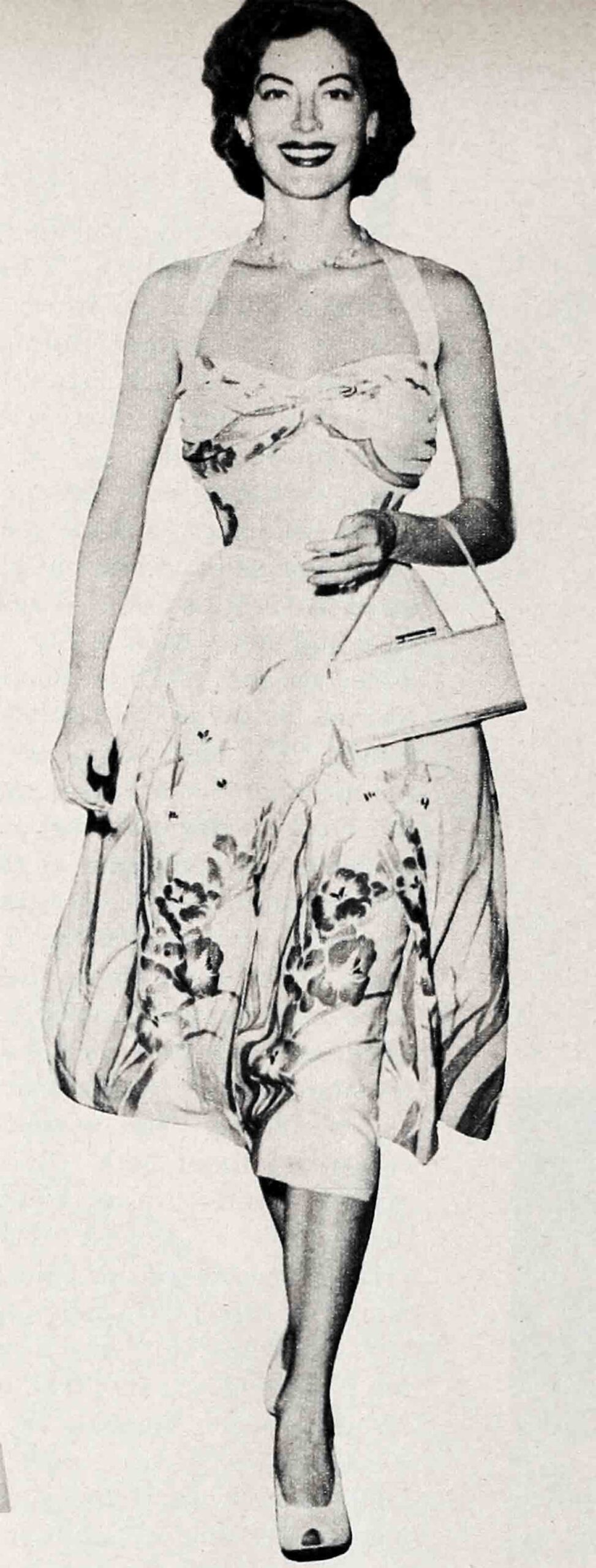
You’d never think that the now super-sophisticated Ava was once a farm girl
But every time I’ve seen him lately, he’s looked like a picture on a magazine cover. Maybe Janet has had something to do with the change. She’s a level-headed, hard-working girl. I think Tony really fell in love with her after their marriage. During their courtship days, he had a take-it-or-leave-it attitude toward Janet. As her husband, he followed her all the way to Colorado and stayed with her while she was making a picture. The two kids started their married life simply, living in a small flat and doing most of their own housework. Now they’ve moved into an ultra-sophisticated apartment decorated by that master, Mitch Leisen. Professionally, they’re hot kids and know it.
Ava Gardner has changed outwardly more than any star I’ve known. When she came here fresh from North Carolina and was put under contract at Metro, a studio representative showed her around the lot and introduced her to Mickey Rooney, then a kingpin with Leo the Lion. As they left the soundstage, the studio man said, “Now that you’ve met Mickey Rooney I hope you’re satisfied.” Ava was so mortified she burst into tears.
She never seriously wanted to become an actress; and recently she said to me, “Acting is not the be-all and end-all of my life.” More than anything, Ava’s wanted a happy home and children. But fate seems to have other plans. With each picture she improves; and in “The Snows of Kilimanjaro,” she’s terrific.
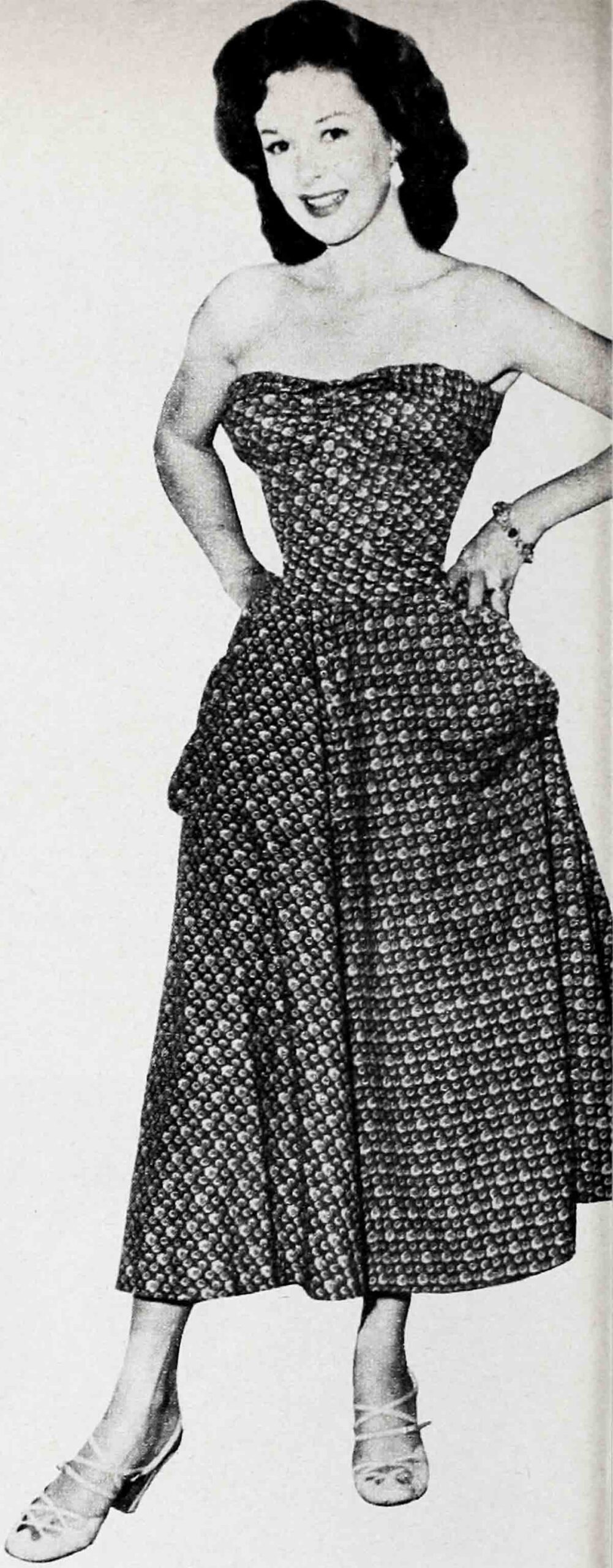
Hedda wonders if Susan remembers her loneliness in the heartbreak town
When she married Mickey Rooney, Ava was still a naive young girl. But she was beautiful, and the Mick enjoyed showing her off. Ava got a thorough initiation into Hollywood with that human dynamo. She acquired poise and dropped her southern accent. But she was still known chiefly as Mrs. Mickey Rooney—and was content with the title. But eventually she tired of the hectic life, divorced Mickey and married Artie Shaw.
With Artie, she began to acquire a veneer of culture. He knew books and good music. He was also, the world knows, a free soul; and I think he indoctrinated her with something of the same spirit. The quiet little southern girl turned into a sophisticated woman, restless, reckless, and heedless of public opinion. Her torrid romance with Frank Sinatra made international headlines. In fact, when the bull- fighter Mario Cabre moved in on the scene, the press of two continents practically turned the affair into a comic opera. It was hard to believe that the girl making all those headlines was once a farm girl who picked bugs off tobacco plants.
Ava is firmly established now as an actress; but if she had to make a choice between home and career, she wouldn’t hesitate to pick just “Mrs.” without the trimmings. But Hollywood has taught her one invaluable lesson. She won’t allow anyone to push her around. I know, because when I criticize her, as I often do, she doesn’t burst into tears as she did when the Metro man made the snide remark about meeting Mickey Rooney. She stands up and fights.
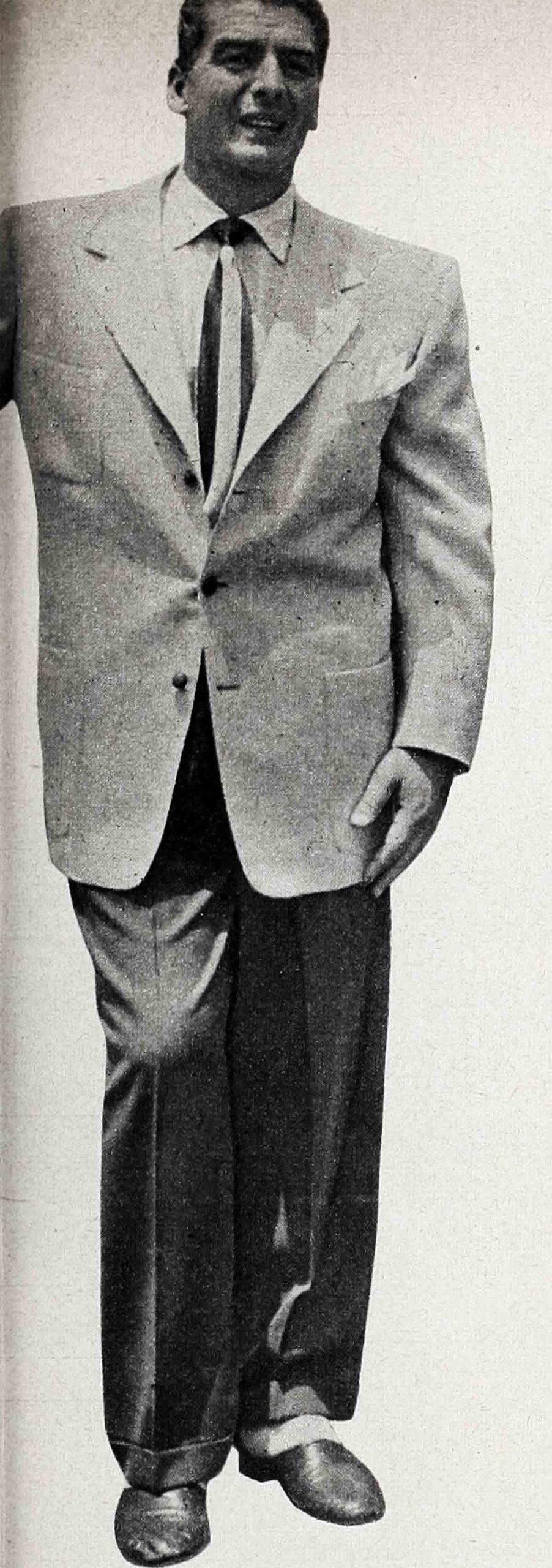
Vic had a reason for his mad behavior. But now he’s a different man
I had a tip that Ava would play opposite Gregory Peck in “The Snows of Kilimanjaro”—but nobody would confirm it. I heard later that Twentieth had kept the casting a deep, dark secret until Susan Hayward had finished her part of the film and left the lot. There were fears that she’d blow a gasket when she learned Ava had the plum acting role in the picture. Susan is a fine actress; and she’s fully conscious of it. So she’s not without temperament. After “David and Bathsheba” with Gregory Peck cleaned up at the box office, she went to RKO to do “The Lusty Men” with Bob Mitchum. I asked Bob how he got along with Susan. He said, “I had to be a gentleman because I was afraid if I got out of line, she’d go back and tell Gregory Peck.”
Years ago, a friend of mine lived in the same apartment house with Susan. On Christmas day they met in a hallway. Both were unknown and far away from home. So the guy introduced himself and suggested they celebrate the day together, since they were both alone. They did. But no romance blossomed. Susan married Jess Barker, and worked her way slowly to stardom. Jess gave her a set of lovely twin boys; but he just didn’t seem to click as an actor. Our producers were interested in her, not him. I’ve often wondered if that hasn’t been a thorn in Susan’s flesh. I’ve also wondered if Susan remembers a lonely young girl who shared a Christmas with a lonely young man years ago in a town noted for its heartbreaks.
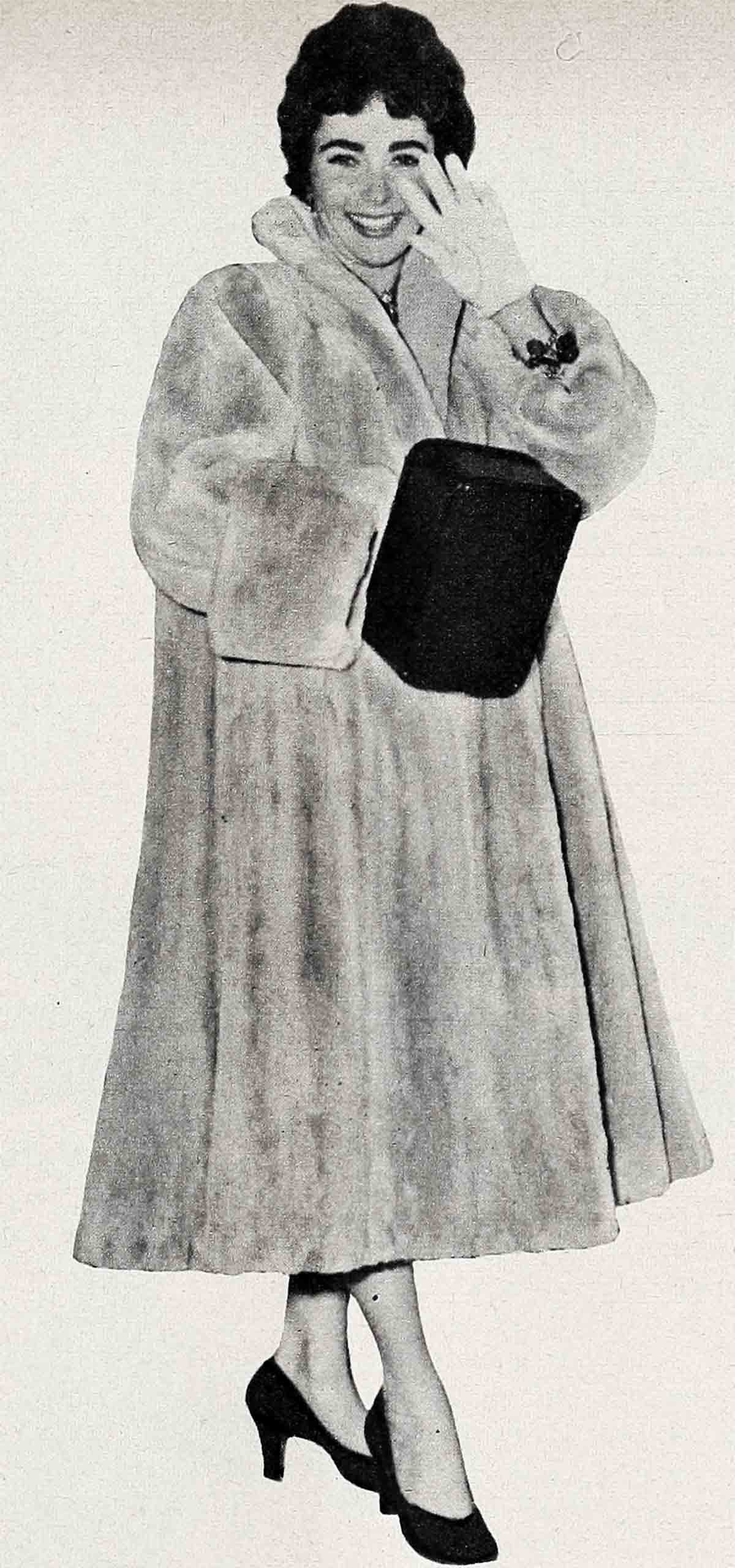
Elizabeth is a new woman. But has she as yet learned to handle responsibility?
Hollywood is certainly not without its fabulous successes. One day Al Levy, a smart agent, said to me, “I think the screen is ready for a new feminine singer; and I’ve found her.” I asked who she was. “A kid named Doris Day. She’s with Les Brown’s orchestra at the Palladium. I’d like to bring her around to meet you.” I told him to go ahead. When Doris walked into my office, I thought Al was nertz. She was a cute, wholesome-looking girl; but there was nothing about her to suggest to me that she’d become Miss Movie Box Office.
At that time, Doris was living in a trailer without a quarter to her name. But Warners soon had her under contract. Since there were no feminine singers on the studio lot, Doris was put into one musical after another, and through the help of Al Levy and the guidance of Director Mike Curtiz, she learned to act and became a star. There was a bit of unpleasantness when Al Levy and his partner, Marty Melcher, dissolved their agency. Doris stuck with Marty and later married him.
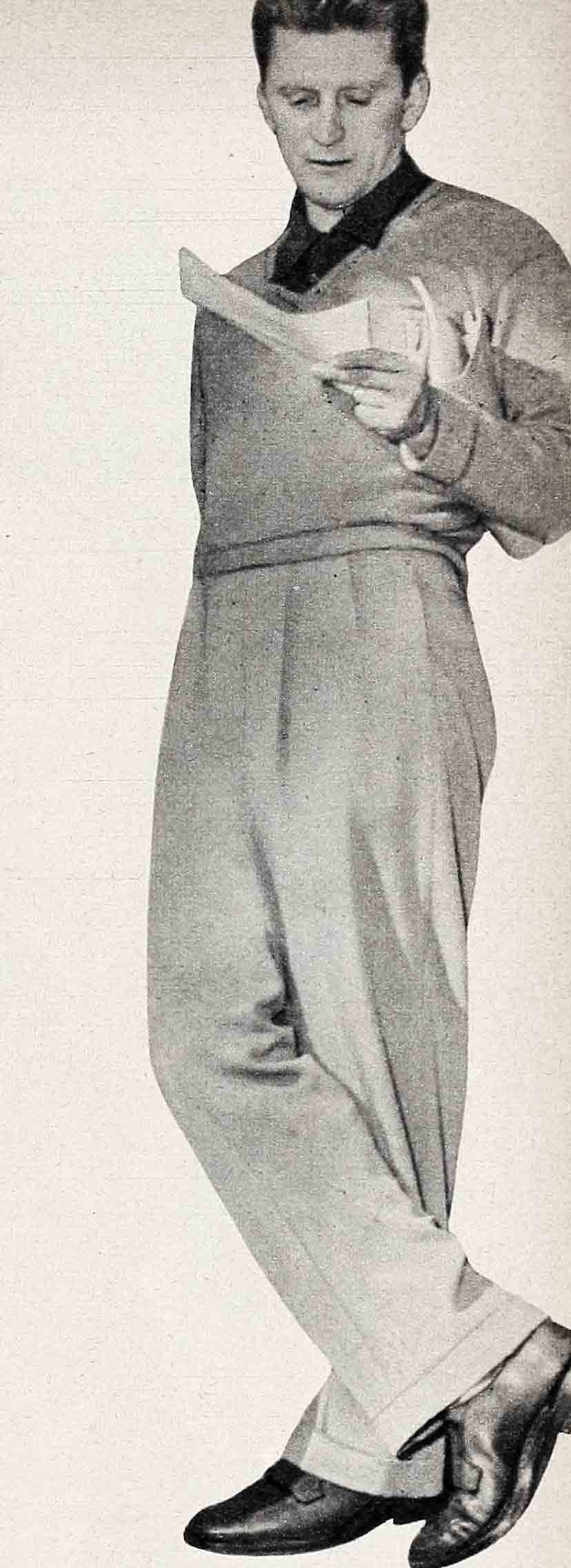
Hedda’s never seen a man change so fast, nor deny it so emphatically
Though obviously pleased with her success, she’s been too busy working to go Hollywood. She’s one of the exceptions who remained normal. Sometimes she even astounds Marty with her practicality. When they went to Burbank to get their marriage license, the clerk was out to lunch; so Doris asked Marty to drive her back home so she could get a bite, too. “Imagine anybody being hungry at a time like that!” Marty exclaims. But he did as requested. That’s how matter-of-fact the girl has remained.
The Melchers have a house with a swimming pool and barbecue pit, and they avoid the bright lights as much as possible. “I married a girl, not a movie star,” says Marty. She, being somewhat vague, leans heavily on him for advice. When I see her off the sound stages, it’s still hard for me to believe she’s a star. She got used to wearing skirts and blouses in her lean days, still prefers them to fancier garb.
Doris and Gordon MacRae came up together, often playing in the same pictures on the Warners lot. Success hasn’t changed Gordon either—except that when you try to locate him he’s usually on the golf course. He has a happy disposition. For a while his agent’s office was next to mine; and Gordon was forever popping his head in to say “Hello.” Usually he was singing, and dressed in some outlandish getup. One day he came in yelling that his wife had a new baby. You’d have thought it was the only child ever born. Gordon’s a devoted family man. Except on the golf links, he’s rarely seen without Sheila. Their best friends are the Jeff Chandlers, whom they met when all four were trying to get a foothold in show business. When Jeff and Marjorie separated, it was the MacRaes who got them back together. They’d invite the two to dinner without letting one know the other was coming.
There are a few others who remain untouched. John Wayne, Number One boxoffice star, doesn’t make many new friends, but he’s utterly loyal to the old ones. Director John Ford gave Wayne his first screen break; and the actor vowed he’d do a picture for Ford any time he was asked. He’s kept that promise.
Years ago I found a young actor in a radio studio playing opposite Bette Davis. I wrote a nice piece about him in my column. Today he needs publicity like he needs a hole in the head, but he never forgets to thank me when I say something nice about him. His name is Alan Ladd.
Hollywood was the making of John Payne. In the old days I couldn’t stand him, because he seemed soured on the world. Not long ago he explained that he was having domestic trouble and was being overworked. “I couldn’t figure out where I was headed or why,” he said. Today, with three children and a successful career, John is as pleasing as they come.
Perhaps the man Hollywood has changed most is Errol Flynn. He came here a dashing, charming adventurer, with not a care in the world. He made lurid headlines, but even during a trial for supposedly being overly affectionate with a teen-age girl, women stood at the courthouse door, asking for his autograph. At the height of his fame, I sat talking with him in his beautiful hilltop home. Below, the million lights of Hollywood blinked. I said, “Errol, it looks as though you’ve got everything a man could desire—looks, wealth, fame, women at your beck and call. What has the set-up cost you?” He replied, “Plenty. It’s taken from me my zest for living.”
Before he left for England last summer, he called on me. The old charm was there; but the devil-may-care attitude was gone. “Hollywood was made for fun,” he said, “but you can’t have fun here any more. Even the tourists complain about the place being dull.”
Victor Mature, on the other hand, has been mellowed by Hollywood. Before the war, he was the town’s greatest prankster The stunts he pulled for the press caused some of his bosses to scowl. “You know, and I know I can’t act,” Mature explained. “Until I do, I’ll have to keep my name in the limelight in my own way.” But he did learn to act. After his discharge from the Coast Guard, however, he was never the old Vic again. “I feel that I’m four years behind in life,” he explained to me. “When I started the night-club circuit again, I found the spots were inhabited by a whole new crowd. So I decided to stay at home.” The dashing Vic then got married and acquired a stepson. Until a couple of months ago he still lived in the same small house he occupied in his bachelor days; and he’s only slightly interested in seeing his name in print. He works steadily in pictures, investing his money in television and electrical appliance shops, and spends most of his spare time on the golf course.
He’s even developed a sense of humor toward a profession that once meant his whole life. When the Los Angeles Country Club refused him admission because he was an actor, he said, “I’ll show the members all my pictures and critical notices, which should offer ample proof that I’m not.”
Elizabeth Taylor’s mother, ambitious for her daughter to have a screen career, brought her to my house for advice when she was very small. Liz was far more interested in a chipmunk she’d brought with her than she was in either me or becoming a star. She’s always been crazy about animals; so she was a natural for “National Velvet.” I had regarded her as a child until I was dining in the Metro commissary one day. Liz entered and suddenly I noticed every male eye in the place following her. With a shock, I realized that Liz was growing into womanhood.
However, I wasn’t prepared for the romances that followed, culminating in the fairy-tale marriage to Nicky Hilton. After their split-up, I went to see Liz; and if I ever saw a perfect picture of what Hollywood could do to a girl, it was then. There she sat, barefooted and wearing a beautiful lace negligeé, with a look of stunned bewilderment on her face.
“All my life,” she said, “I’ve been riding on a pink cloud. Because I was a movie star everybody told me I was great when I wasn’t. I was the little princess for whom everything was done; now I don’t know how to assume responsibility.” I advised her to take things easy. “I can’t,” she said. “I’ve got to keep working. I need the money. You have no idea how much I’ve spent on hospitals, doctors, and nurses.” I reminded her of a block of stock Nicky had given her when love was in bloom. She appeared surprised and said, “I don’t know whether I’ve got | that stock. I’ll have to ask somebody.”
That’s an item that the average person wouldn’t forget; but Liz had been going her carefree way, thinking the pink-cloud ride would last forever. At that time her constant male escort was Stanley Donen. I believe that, in her confusion and desperation, she would eventually have married him, if Metro hadn’t sent her to England to make “Ivanhoe.” There she grew to know sophisticated Michael Wilding; and it was inevitable that she would fall for his worldly charm.
After their marriage, the change in Liz was again surprising. Like a rubber ball she bounced out of her gloom, recaptured her gaiety and talked with the amused maturity of a contented woman who knew the ways of the world. If this marriage should hit the rocks, Liz won’t be alone, because she’s expecting a baby. But I still wonder if she’s learned to handle all the responsibility heaped upon her.
Kirk Douglas brought to Hollywood that all too rare quality among actors—humility. He was married, had two children, and lived modestly. His first film role was “The Strange Love of Martha Ivers,” and I think he did his best acting job in it. Kirk later told me that the picture nearly killed him off professionally by establishing him as “a weak-willed, sexless character.” When his name was brought up for strong roles, he explained, producers would say, “Not that guy. We want somebody with sex and punch.”
He might have remained a character actor or faded completely if, against the advice of friends, he hadn’t taken a chance on doing “Champion.” Overnight he became a star with fabulous contracts being offered him all over town. He got enormous publicity; and I never saw a man change so fast. The erstwhile modest Kirk now radiated self-confidence that bordered on cockiness. Though he declared to me that his sudden rise to fame had nothing to do with it, he and his wife divorced. She took the kids east. Kirk began living the life of a successful bachelor to the hilt, making the rounds with all the glamour girls.
When I brought up the subject of these changes, he laughed and said, “I don’t think I’ve changed a bit. It’s the other people who have. When I first came here, I attended an Atwater Kent party. During the whole evening, I couldn’t get anyone to talk to me, though I tried hard. That’s the loneliest time I spent in this town. People talk to me at parties now.”
On almost every picture, Shelley Winters is accused of going temperamental, and perhaps she does. But she’s always been that way. “I came up fighting,” she says, “and never learned to do things the easy way—that is, diplomatically.” She wanted a screen career; so she went after it tooth and nail. She wanted Vittorio Gassman, and got him. She’s highly criticized for not dressing and acting like a star; but that’s part of her nature. It always has been.
But one never knows when the heady fumes of fame and wealth will get the upper hand with a star. Just before Rock Hudson left for England to make “Toilers of the Sea,” he told me he was perfectly contented with his contract and salary. “Want to bet that your attitude will change within a year?” I asked
“I’ll take that bet,” he said.
So I put five dollars on the barrelhead that says Rock will change.
It’s sad sometimes, watching nice youngsters go the way of all flesh. Some of them grow through their mistakes, Others will never learn.
THE END
—BY HEDDA HOPPER
It is a quote. PHOTOPLAY MAGAZINE DECEMBER 1952


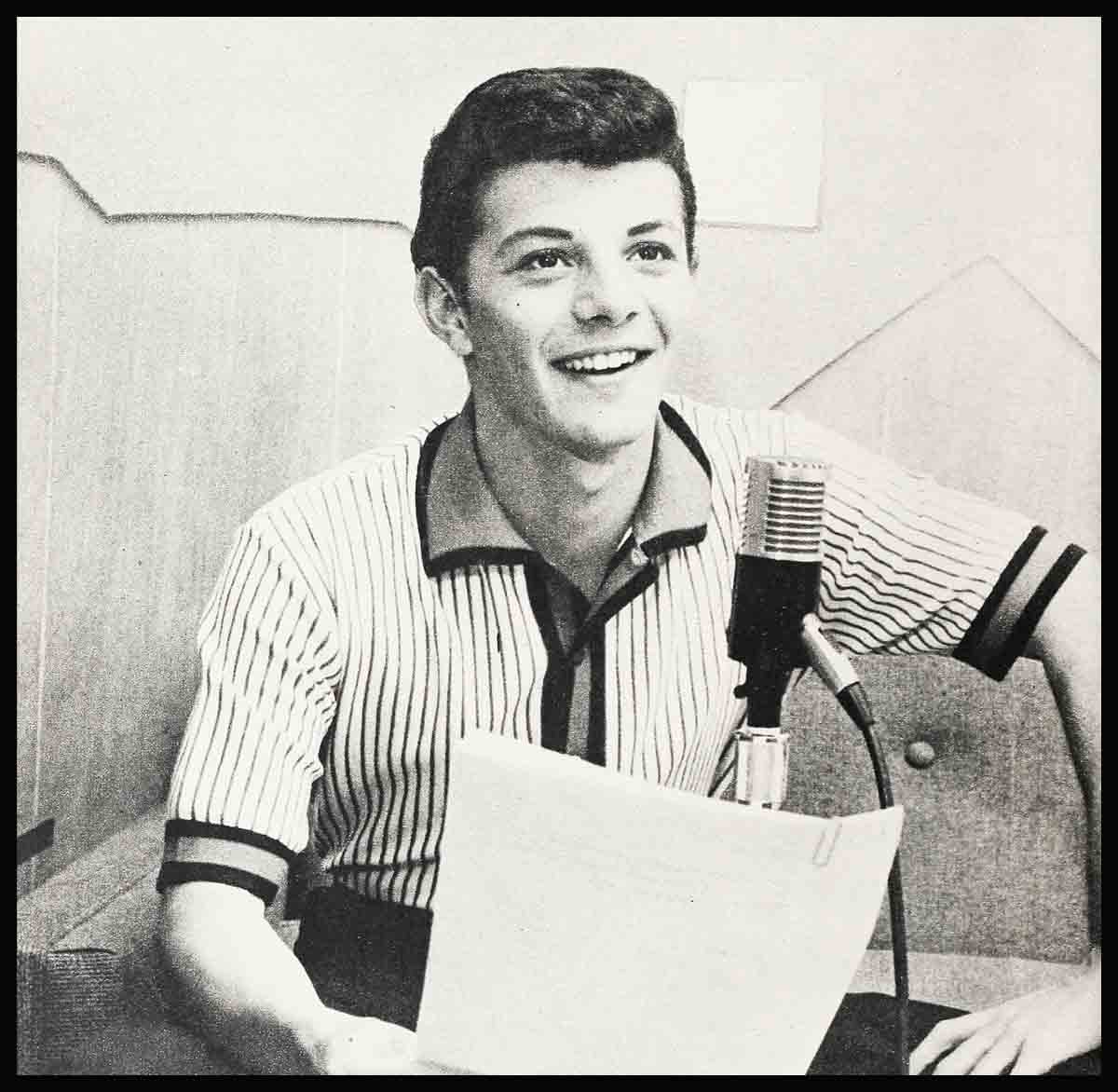
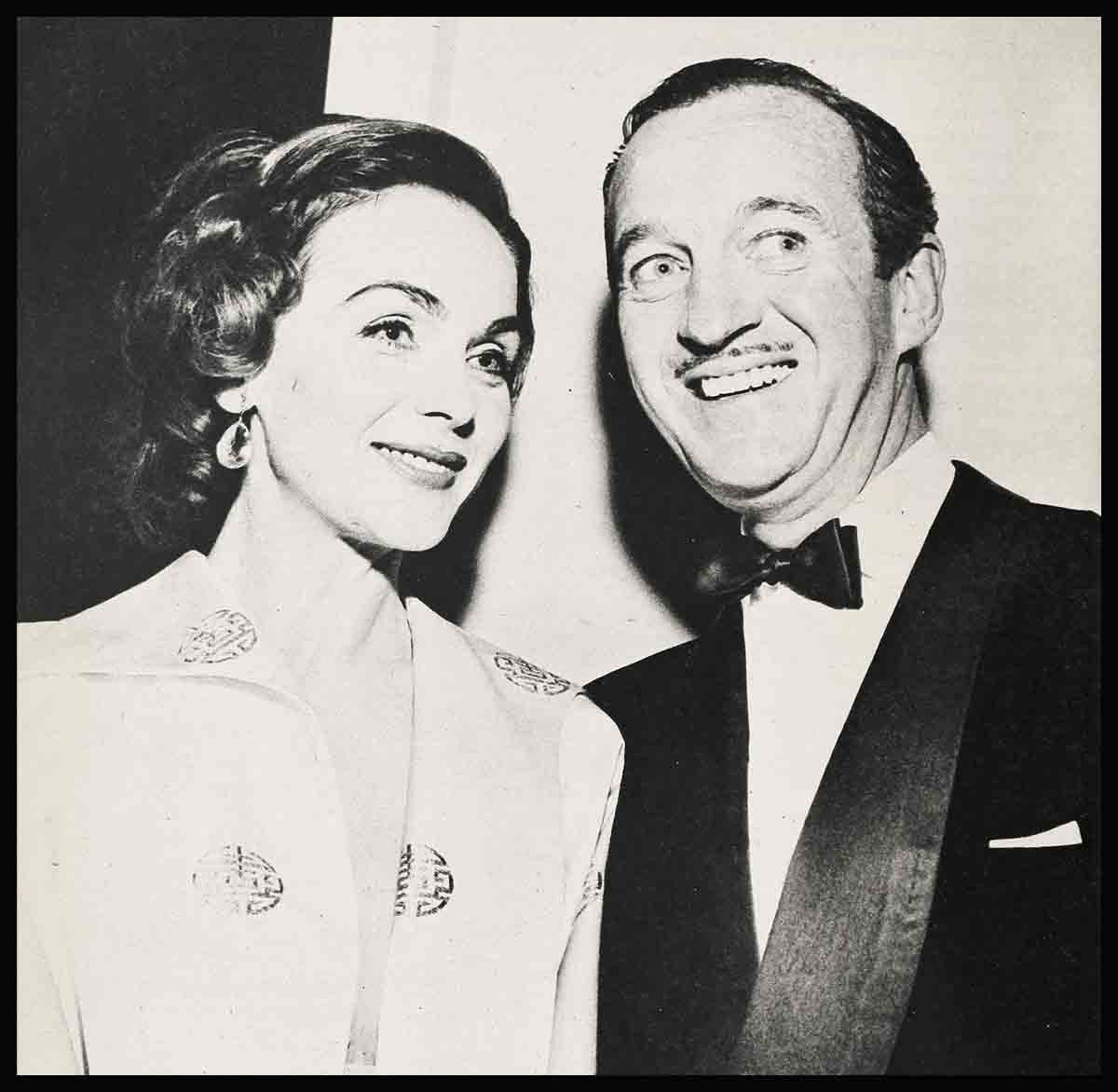
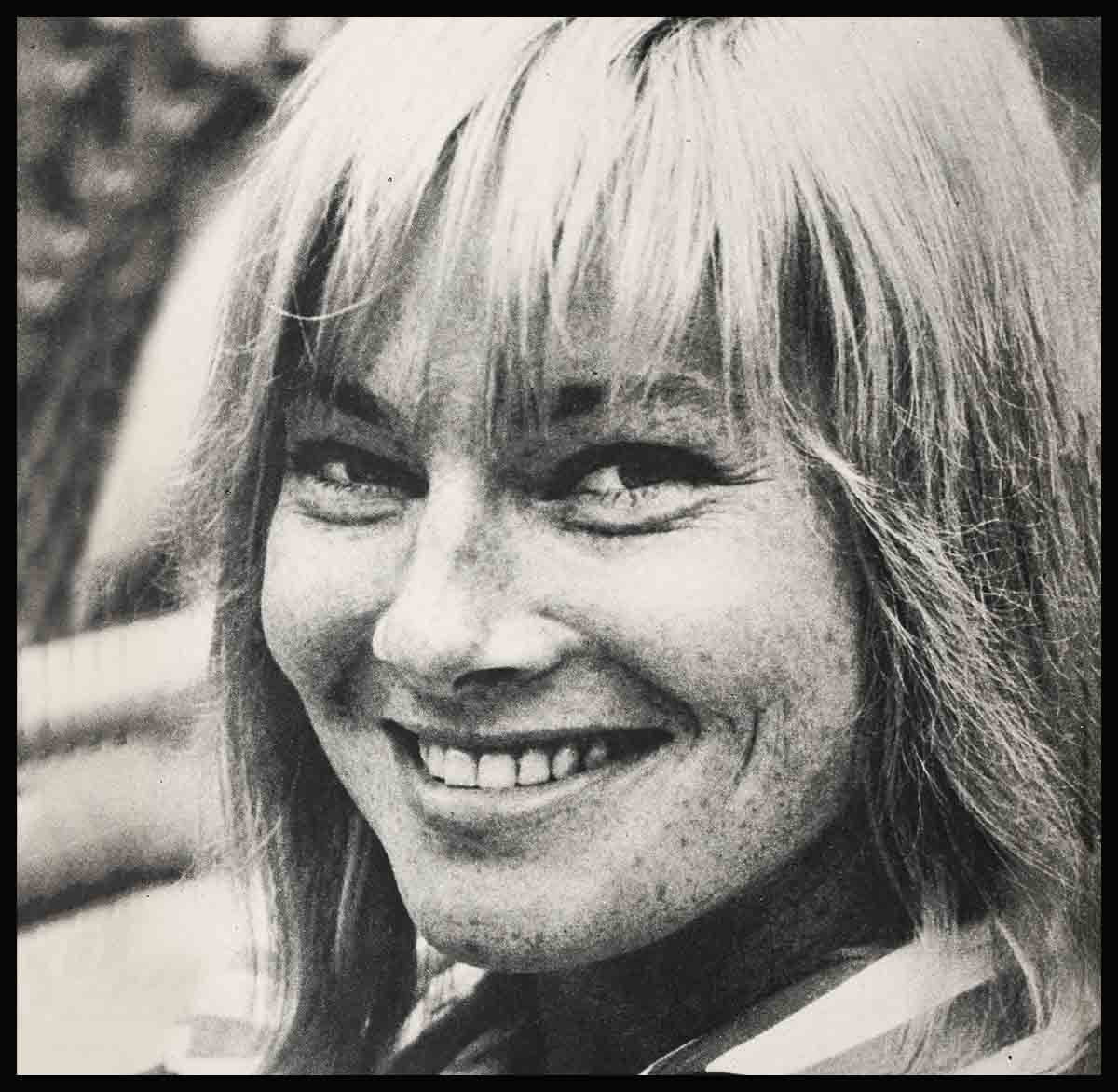
graliontorile
21 Haziran 2023I don’t ordinarily comment but I gotta state regards for the post on this amazing one : D.
vorbelutrioperbir
4 Temmuz 2023It is truly a great and useful piece of info. I am glad that you simply shared this useful information with us. Please stay us up to date like this. Thank you for sharing.